ABOUT US GO2 is the green emission we encourage to produce to save our planet. Instead of emitting harmful gases like the famous CO2 we are encouraging people to spread awareness about what is happening in our environment and offering different ways to help.
Don't wanna be here? Send us removal request.
Text
TABLE OF CONTENT
how can individuals help reduce single-use plastic
UAE paves way for zero-carbon electric cars.
By: Reem Alkaabi
_____________________________
Food Preservation: How UoS Students Can Practice Sustainability
Going Paperless: Will it work for UAE schools?
By: Shamma Fahad
_____________________________
“THE PODDER” saves the earth!
Man finds a way to cleanse our lakes
By: Aseel Alnaser
_____________________________
Peanut Packaging: Who said they can’t be eaten just like regular peanuts?
Toothpaste Tubes: Why not pop a pill instead?
Plastic straws: Edible Straws to the rescue.
By: Jude Gharaibeh
0 notes
Text
How can individuals help reduce single-use plastic.
By: Reem Alkaabi
Environmental protection is the main objective of the UAE's development policies aimed at increasing green areas, developing water resources, improving the marine environment and protecting it from pollution, preserving fisheries and livestock, and developing strategies to protect biodiversity.
The United Arab Emirates joined the world in recognising environmental problems by signing and ratifying environmental agreements. UAE aims to achieve sustainable management and efficient use of natural resources and environmental conservation. A list of legislation has been developed to ensure a sustainable environment for life. It also introduced several federal laws, ministerial decrees, and executive regulations.
Straws, plastic water bottles, and plastic bags belong to a group of materials known as single-use plastics. Here are some facts that show how ubiquitous single-use plastics have become: Half a million straws are used in the world every day. Each minute 1,000,000 plastic bottles are purchased worldwide. An estimated 4 trillion plastic bags are used worldwide each year.
How individual can help reduce single-use plastic to ptotic the environment. We have all seen the major environmental problems caused by the use of single-use plastics. What can we do to cut your plastic footprints?
Here are our 7 top tips:

1. Carry a reusable bottle
Carrying a reusable bottle is a great way to cut your plastic use and save money too!

2. stop plastic straws
Next time you order a drink, think about whether you need a straw and if you don’t just say no. You can also ask your local pub to stop adding straws to drinks as standard and offer paper straws to those who want one.

3.Take a reusable coffee cup
You can get a discount if you carry a reusable cup with you in the cafe.

4. Making a different choice in the supermarket or choosing a different place to shop, we can all try to cut down the plastic we buy. For example, we can use loose fruits and vegetables that are often cheaper than a pre-packaged alternative.

5. Use refill stations for detergents.
There are some products where it is difficult to avoid a plastic container (for example, washing up liquid or laundry liquid), but there are amounts of places where you can refill your old bottles.

6. Say no to disposable cutlery
If you bought salad or yogurt in a cafe or at the train station, only the cutlery is plastic. Consider carrying a spoon or fork in your bag or keeping tableware in your office while you work.

7. Carry a shopping bag.
If you still have trouble remembering it, try a folding bag that you can carry in your regular daily bag.
Making some small changes can make a big impact on the amount of plastic we use every day.
youtube
0 notes
Text
UAE paves way for zero-carbon electric cars.
By: Reem Alkaabi
Our mom’s planet is in trouble, and we are the problem. In the past hundreds of years, we have damaged our planet. Estimated CO2 emissions in 2018 increased by about 2.7% over 2017. Moreover, one of the most important reasons is cars that rely on the combustion engine because they are a major cause of global warming. Today, the last thing we can do is to avert further disintegration to lessen our carbon footprint. One of the significant plans is to reduce the utilization of petroleum derivatives. Thus, fuel cost and accessibility won't be a worry and people will be more healthy.
Here, electric cars come in. The choice of electric vehicles is best because its carbon-free car exhausts, which saves the environment from pollution. Electric vehicles are the future, and the reason is various advantages.
Advantages of Electric Cars:
Carbon Emissions and Pollution:
High carbon emissions from these fuel vehicles pollute the environment and damage the ozone layer as a result of pollution caused global warming and rising temperatures and weather deteriorating day by day. Furthermore, the carbon footprint of electric vehicles is just a small amount of ordinary cars. Low destructive exhaust emissions are a good news for our health. The better air quality will reduce medical problems and costs caused by air pollution. Electric vehicles are quieter than oil and diesel vehicles, which means less noise pollution.
Safety Improvements:
Recent results have shown that several Electric cars feature can improve safety. Electric cars tend to have a lower center of gravity that makes them less likely to roll over. They can also have a lower risk for major fires or explosions, and the body construction and durability of Electric vehicles may make them safer in a collision.
Renewable Energy
If you use renewable energy to recharge your electric vehicle, you can reduce your greenhouse gas emissions even further. You could recharge your electric vehicle from your solar PV system during the day instead of from the grid. Another idea is to purchase GreenPower from your electricity retailer. Then, even if you recharge your electric vehicle from the grid, your greenhouse gas emissions are reduced.
Eco-friendly Material
Electric cars are made from recycled materials such as recycled water bottles and plastic bags and old car parts and even household appliances.
Fuel Costs
Running expenses of an electric vehicle are less than those of fuel-based autos since electricity is less expensive than gas. With rising fuel costs every month, there is a big question on everyone’s mind on the sustainability of fuel-powered cars and their affordability in the long term. Additionally, We all realize that the world is running out of fossil fuels and that oil resources are running out as well, so the long-term availability of gasoline and diesel is a major concern.
Fast Chargers
If you do have a place to charge your car at home, consider installing a fast charger. If you use a regular home socket, the charger rate depends on a power supply. Fast chargers are industrial chargers that can charge most new electric vehicles to 80 percent in 30-45 minutes.
To make Earth's future health more and better these days, Tesla and Bavarian Motor Works and Nissan are manufacturing electric vehicles.
Dubai and electric cars
Dubai Electricity and Water Authority (Dewa) has passed a law to provide free public parking for all-electric cars in Dubai. And that’s not all, Dubai has also set-up public charging stations which people can access and charge their electric vehicles for free until the end of 2019. There are about 100 charging stations located throughout Dubai now, and this number is expected to double by the end of next year.
A statistic from Gulfnews, asking people whether they would buy an electric car?
Yes: 59%s
No: 41%
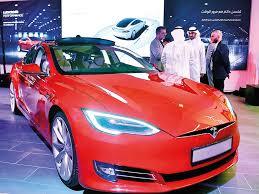
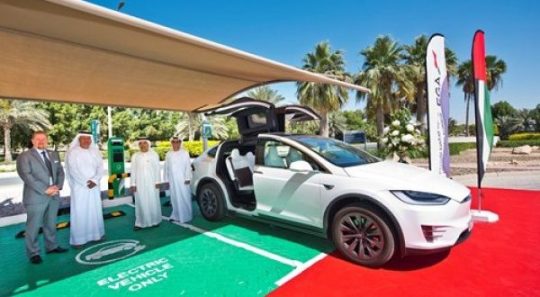
0 notes
Text
Food Preservation: How UOS Students Can Practice Sustainability
By: Shamma Fahad
I was walking with two of my classmates on campus one day, and had stumbled upon a half-eaten sandwich on the ground. It looked like the person who bought it did not take more than two bites.
After that, we had to stop and snap a picture of it, but it got us thinking that there must be other places in the university where things like this happen too!

Photo by: Ohoud Khalid. Half-eaten sandwich on the ground.
Food waste is known to contribute to harming the environment by releasing greenhouse gases. This is mostly coming as a result of food being dumped into landfills instead of being recycled for better use.
It’s been noted that GCC countries have seen an increase in food waste during the last decade, with the UAE estimating at 197kg food wasted per person, according to a research posted by Dubai Industrial Park and The Economist Unit.
Although certain initiatives have since been launched to preserve food specifically in the hospitality sector such as, hotels and other commercial places, very little attention was payed to food waste that can happen in educational institutions.
UOS Students’ Responses
According to an online survey conducted on a sample of 30 UOS students, 86% of them have noticed food wastage in different parts of the university.
A range of food and drink, from coffee and sandwiches to rice plates and pastries have been observed either thrown or left to rot. It was mostly noticed either inside the cafeteria areas or outside near the parking lots.
The survey responses made it clear that students wanted to do something about this food waste, and this is what some of them suggested:
“Decrease over-consumption.”
“Add more trash cans, install compost bins!”
“I suggest that food waste could be decomposed and used as a plant fertilizer to help healthy plant growth. Recent studies also found that we can extract energy from food waste.”
“Give it to strays on campus.”
“The university could corporate with a non-profit company that recycles food waste”
Opinions of an Environmental Sciences Alumna
After that, I realized I needed to take it upon myself to do further research on this issue, and decided to ask Maryam AlGhufli, an environmental sciences graduate, what she thought about food waste in UOS.
Have you observed food waste during the time you were in UOS ?
Yes, and it was not restricted to the cafeteria only as students are allowed to eat in almost all university facilities.
You took a food waste management course as part of your environmental sciences program, what are some methods you remember?
Specifying garbage bins for organic waste to facilitate the segregation process in order for organic waste to end up being composted. Composting services take this food and turn it into usable soil.
(To refer to the meaning of “composting”, https://dictionary.cambridge.org/dictionary/english/composting)
Are there any methods you suggest UOS should implement?
Segregating waste by distributing specified waste bins.
Any comments or suggestions?
Students must be aware of their food consumption, and shouldn’t order food above their need. They must also be reminded of the detrimental effects of food waste ending up in landfills and its link to climate change.
youtube
Provided above is an example of a food waste composting service in Abu Dhabi.
How Authorities Can Help UOS Reduce Food Waste
I spoke with two government authorities’ representatives regarding this food waste and asked them how UOS and especially students can work to reduce it.
Sarah Alnaqbi, a marketing outreach officer from Bee’ah, told me that they do have several waste management methods, however not entirely on organic waste, “our facilities are mostly responsible for solid waste excluding food, other corporations do that mostly.”, she said.
She added, “there is a method I know that would be used, which is converting food waste to fertilizers, but it can be costly and the food unfortunately ends up in landfills.”
Alnaqbi also pointed me towards Sharjah’s new waste management project, “Waste-to-Energy” launching in 2020 where waste will be converted into energy to power UAE homes.
youtube
Video above: Bee’ah’s Waste-to-Energy Project
UOS Students to a Sustainable Future
When I interviewed a representative of Dubai Municipality, she told me that educational institutions are indeed places where a lot of food can be wasted.
She also gave me a list of several ideas that UOS could implement:
A circular system, which can be used to develop the university’s geography in terms of soil chemistry.
This idea would be as follows:
1. Awareness campaigns about segregation of waste specifically food waste.
2. Create a sustainability students club which is chaired by a professor in the relative field.
3. The student club can push the university to invest in a building designed to be a commercial kitchen and nonprofit restaurant run by the students for the students; the conditions of the products utilized in making the meals is that they are to be locally sourced.
4. This will activate the need of the students to have their own farming patch in the university, which will be tended by them and by that, they utilize the food waste in growing their own products.
5. The benefits from this initiative is increasing the tangible understanding of how “waste” can be seen as a resource rather than just waste, there are of course more active research and study benefits than what’s mentioned above (i.e. soil chemistry, especially since we are a desert region).
I concluded my research interview with her by asking a few questions to help me understand more on what values should be considered when it comes to reducing food waste, and how everyone can contribute:
Can you provide a description of the food preservation methods the municipalities execute?
“Waste is collected at a daily basis and is stored for less than 24 hours in a closed bin. Different places will have different storage methods, hotels are usually the most developed in this matter.”
Would it be a good option to collaborate with authorities to provide specified storage bins or facilities or composting services?
“Most certainly it is a good idea, not necessarily would you have to engage authorities, you may also engage private companies who are working to develop themselves in this field. Succeeding in engaging the gov sector, private sector and academia will be a step forward in activating the triple helix-working model, which is necessary for our fast-paced world.”
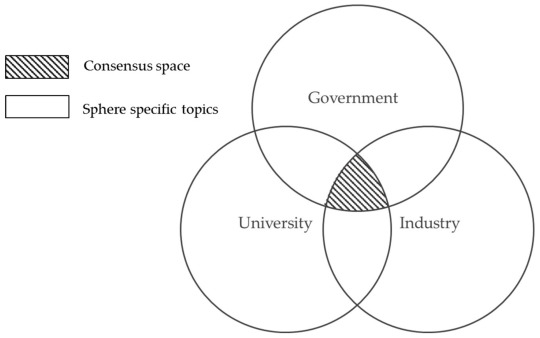
Photo from https://www.mdpi.com/2071-1050/10/8/2646. A simple illustration of the triple-helix model.
Lastly, let’s say if the student based-club was created to have students contribute to monitoring and reducing food waste on campus, where they would hand it in for storage and get rewarded for it in some way by university faculty, do you think it would help?
“Waste segregation is a culture that must be embraced, helping the student population understand how it will affect them personally through emotional marketing strategies in awareness will help us start the journey. Incentives will work well, but it is important to understand that once there are no incentives their actions may not continue. Thus, keeping in mind that the continuity of the work done is important.”
The DM representative told me that she would be more than willing to visit our university to conduct a waste management seminar outside of office hours, “I also have contacts from Bee’ah that would be happy to collaborate in the future to help spread awareness and reduce food waste in the university”, she said.
For further information, check:
https://masdar.ae/en/masdar-clean-energy/projects/sharjah-waste-to-energy-project
https://www.khaleejtimes.com/news/general/how-much-food-uae-residents-waste-in-a-year
0 notes
Text
Going Paperless: Will it work for UAE schools?
By: Shamma Fahad
Print-outs as the main issue
Schools asking students to print out anything from homework worksheets to weekly schemes, and classwork activities to project handouts is nothing new. However, the fact that it can be wasteful should be considered.
Time and time again were there complaints of students required to print over 30+ papers for their finals including study guides and worksheet answer keys. How much paper would they need for one academic year? Will they really use these print-outs for a long time?
The use of paper implies a number of harmful effects on the environment, particularly in its production. Deforestation and burning of wood to make paper releases greenhouse gasses, which contribute to climate change and global warming.
iPads as an alternative

The question here is: if we were to shift schools into using digital devices like iPads instead of paper, will it be effective? Will students be able to adapt?
It’s even better to note that we may be in a technologically-advanced age, but the reality is that students of this generation are not technologically-literate enough for it. Students would usually take long hours to research for their projects, and are then asked to write it all down on paper. At least that’s the case for middle-schoolers. They are exposed to technology and have access to it, but are not knowledgeable enough about it.
A research conducted by HCT’s (Higher Colleges of Technology) Janet Martin discusses Emirati youth’s engagement with technology. Her first finding was that students have a lot of access to the Internet, both from their homes and schools.
Her second finding though, is the one that should be delved into more, “while regularly using digital technologies, Emirati students involved in this research have usually engaged with technologies in a largely unsophisticated way, biased towards consumption and simple, regular access and use, rather than a high level of competence with a range of technology tools.”, she noted.
Despite that, the use of digital technology for education can be a good sustainable solution for our daily practices. “Instead of writing on paper, you can use an iPad to write an email and send it to your teacher immediately without having to print it.”, a cover story from Bee’ah’s School of Environment magazine said, “This saves our resources and time!”.
Bee’ah’s School of Environment (BSOE) is an initiative launched in 2010 aimed to promote environmental preservation among students. There most notable activity is visiting schools to carry out awareness seminars, and handing out informative magazines that are simple and enjoyable to read.

To know more about Bee’ah’s School of Environment, click here https://beeah.ae/en/beeah-school-of-environment-bsoe
It is a good idea to try to install more programs that teach students technological literacy to prepare them to become the ever-evolving green generation of the future.
For further info:
https://www.researchgate.net/publication/280553271_Technology_education_and_Arab_youth_in_the_21st_century_A_study_of_the_UAE
https://www.bsoe.ae/about_us
0 notes
Text
Innovations to cleanse the earth!
the following articles will present innovations that will play a part in cleaning and rebuilding the earth.
by: Aseel Alnaser
0 notes
Text
“THE PODDER” saves the earth!
A new invention named “THE PODDER” might be the invention to save us from the impending doom caused by deforestation. It is a drone created by the innovators Andries Louw and Andrew walker, that shoots out two seeds per second at velocities of between 150 and 300 meters per second. The drones will be loaded with special seeds that look like black paintball bullets, made by a company called AIRSEED.

While this is not the first-time air planting was executed, though it was the first time it was effective. DRONESEED was the first company to come up with the innovation and the reason why it failed is because of the use of heavy equipment, it also had low germination rate which defeated the purpose of the whole project.

The main reason for AIRSEED’s success is because of its different approach to various problems. the AIRSEED products are made from a soil additive called biochar to make them lighter. the highly compressed charcoal is the by-product of the thermochemical conversion of biomass, by compressing the seeds into biochar, the pods become a natural fertilizer.
“Without the seeds the entire project would mean nothing…We had to come up with a solution for the payload that was light; that was viscus, in other words smooth; that was durable and would not break on impact, and that protected the seeds from animals.”
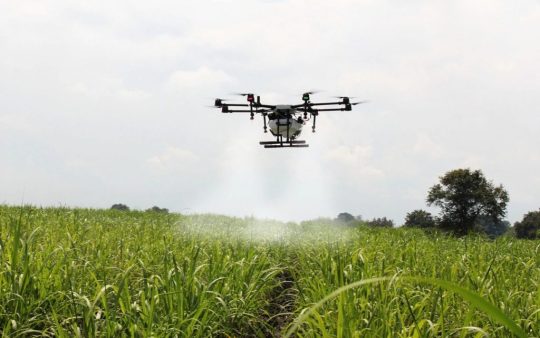
The duo believe that a fleet of their drones could plant up to a hundred thousand trees a year. They estimated that a team of two flying two drones can plant around 40000 seeds into the ground in 10 minutes a day.it is said that a team of 4 can operate 8 drones which could potentially plant up to 160000 trees a day.
This invention came to light after the famous YouTube stars “Mark Rober” and “MRBEAST” started a tree planting campaign to compromise for the losses of the recent Amazon rainforest fire that took place 2 months ago.
youtube
by: Aseel Alnaser
0 notes
Text
Man finds a way to cleanse our lakes
Marino Morikawa is a scientist who came up with a solution to the water pollution we see everywhere. he used his vast knowledge in environmental science to create a completely organic solution to water pollution. The young Japanese man was devastated to learn that his childhood lake was going to be classified as biohazardous due to the severity of its pollution. Morikawa then set out to revive the area’s ecosystem.

According to National Geographic, 70% of human waste is dumped in various bodies of water and without treatment that will destroy the ecosystem entirely.so in 2010 Morikawa took a break from his studies because he wanted to clean up the lake in El Cascajo Wetlands as the water had become a dumpsite which left no form of life in the area. But he was able to cleanse it using 2 inventions: biological filters and a nanobubbling system.
How it works:
The nanobubbling system provides small bubbles that trap and freeze the bacteria and the filters contain that stops the pollutants.
Results:
In just 15 days Morikawa was able to bring back the wetlands to its original full glory. With this, his dream of cleaning the biggest lake in south Africa, Lake Titicaca, might eventually come true.

Although this invention seems flawless, that’s not the case.it has one flaw which is the cost. in an interview, Morikawa stated “people don’t use my solution frequently because it is expensive”
watch this video to find out more!
youtube
by: Aseel Alnaser
0 notes
Text
How is the world innovating to help us become Green Users?
By: Jude Gharaibeh.
The world is now starting to realizing the crises we are going through. From the large number of campaigns done on going green and becoming plastic-free, some decided to take matters in their own hands to save our big world, and become one of the many heroes on this planet.
Innovating is our only skill left to work with, and after problems started to rise, many solutions were born too. The following articles are about the many problems our world is going through, and how some people found clever solutions to each and every one of them.
0 notes
Text
Peanut Packaging: Who said they can’t be eaten just like regular peanuts?
This is how LUSH packages its products.Packaging Peanuts has been known for its fluffiness and soft texture to protect fragile substances throughout delivery, but the original peanut packaging is made up of plastic polyester also know as the infamous Styrofoam. They pile up in landfills and never decay, making it one of the most pollutant substances that reproduce like rabbits.
LUSH, Is a company known for its natural, organic and most importantly naked products, in which they do not package them with plastic but with biodegradable cellophane. when customers order, lush send their packages with peanut packaging to protect their products, even in one situation, a customer was so disappointed in LUSH when her package arrived full of the PP, expressing her disappointment on their official website as such:
“Customer: I was really impressed with the idea of plastic-free shampoo and conditioner, but couldn’t get to one of the shops. As a result, I ordered them online. I was very excited when my parcel arrived, only to open it to find my purchases packaged in polystyrene ‘bullets’! What was the point in buying naked shampoo and conditioner only to have it posted in plastic packaging??? Come on, Lush, think about this!!! LUSH: Hi there! Eco Flo is completely biodegradable so do feel free to pop them in your compost bin. Eco Flo also dissolves in water, so alternatively place them under running water to dispose of them. I hope this helps :)”
That s right. LUSH has its Peanut Packaging fully biodegradable and water dissolving! Their journey wasn’t easy at the beginning when they were trying to come up with a better solution to substitute their styrofoam packaging problem. They came up with a silly idea to the ear which was using popcorn! But then a better alternative cam up as Eco-Flo which was the biodegradable peanut packaging they were trying to find. but that still wasn’t enough, they wanted to take it a step further, and make their own, that way they save so many CO2 emissions from shipping.
Their Peanut Packaging is now made up of potato starch in which it is recyclable and water dissolving. They saved the planet to up to 19 tonnes of CO2 emissions yearly!

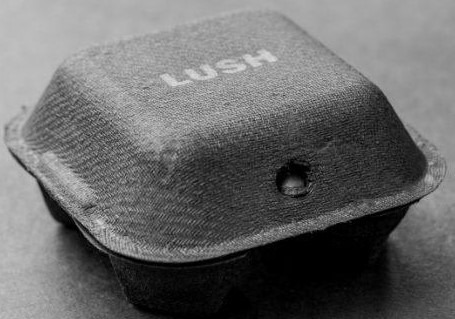

This is how LUSH packages its products.
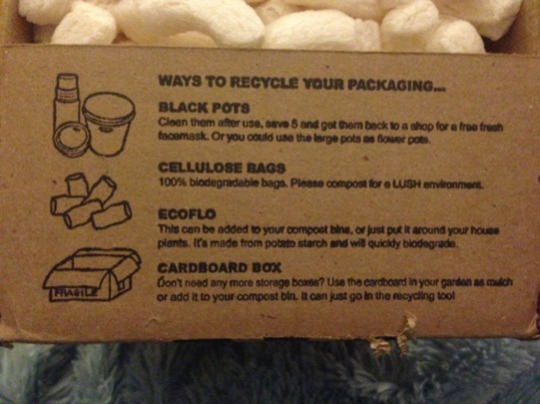
Also on their packaging, they print all the ways you can dispose of their packaging.
In the end, there are many more ideas that I haven’t mentioned, but they all vastly help, and we all should slowly but surely become plastic-free in our day to day life, to ensure our world last longer and healthier.
By: Jude Gharaibeh
0 notes
Text
Toothpaste Tubes: Why not pop a pill instead?
Many of us don’t even realize that toothpaste is one of these problems, maybe we forgot about them and just never considered them, but others made it their goal to get rid of these plastic tubes and make our lives a tad more environmentally friendly.

Nonplastic Beach, just as the name suggests, is a company that realized that toothpaste tubing is a problem. Making it their mission, they came up with the idea of having our toothpaste as pills instead of the gell like substance/ paste, we use these days. When asked why toothpaste, they simply replied with this:
“ Toothpaste tubes are generally made of plastic, often in more than one layer and type, that makes them a nightmare to deal with. There is a very high chance (unless incinerated) that the very first plastic toothpaste tube is still sitting in a landfill somewhere.”
Their pills are stored in a travel tin, packaged in cardboard boxes that are even thought to be travel-friendly! Each tin can contain either 60 or 240 chewable Flouride toothpaste according to customer’s needs. If you are afraid of the price, then you have nothing to fear because their prices are very much affordable.
Nonplastic Beach Toothpaste tablet packs are on the world’s first long haul, single-use, plastic-free flight with Etihad Airways!
This is a video showing Etihad Airways using their product
youtube
By: Jude Gharaibeh
0 notes
Text
Plastic straws: Edible Straws to the rescue.
Some people predicted the future before we knew what hit us. LOLIWARE is a company that makes biodegradable straws from seaweed! Founded in march 2015, Chelsea Fawn Briganti is the co-founder and CEO of LOLIWARE. is a problem in the rising, she came up with this idea to save the world with. The straws are carbon-capturing because they are made up of seaweed and they are Hyper Composable and Marine degradable. Her vegetable-based oil straws can last up to 18 hours of continuous use and are Gluten-free, Sugar-free, and Non-GMO. they have over 500 partnering companies and are aiming to reach more people. Their main slogan is “ Designed to Disappear”.
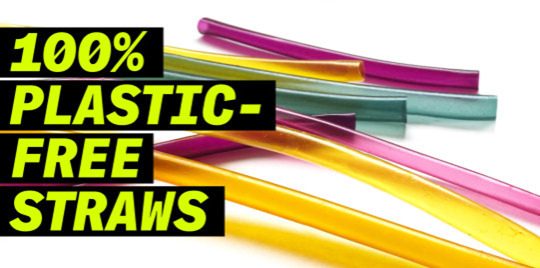
They come in many colors.

These are their main objectives.
by: Jude Gharaibeh
0 notes
Photo

Reminding everyone that we have a planet that needs our help!
0 notes